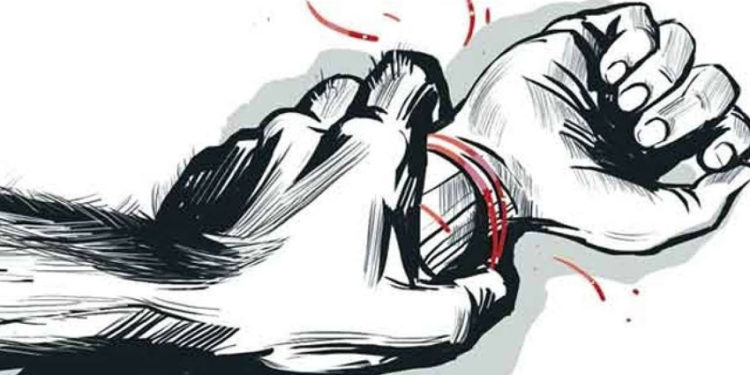By Henry Mutebe
Social media in Uganda is bursting with a rape story in which one young lady accuses a famed youthful TV host of having raped her. Let me be clear. I do not (at this time) know what happened. As such, I pass no judgment against no body. It will not be my intention, in this piece, to try to assume the role of a judge on a matter in which I am outside the compound of facts to ascertain what happened.
My discussion here, as is routine, is to merely pause the event, break it down and reflect on its properties (especially the reaction of the public), with a view to extending understanding and constructing some knowledge around the issue. I think the real learning, or may be unlearning, about this phenomenon will be best extracted from the reaction to the event, much more than the event itself.
Every now and then, light shines upon one particular dark corner of our society and for a moment, the public is gifted, by the ever rolling of wheels of the media, with an opportunity to see, with liberating clarity, the filth and dirt that lies in the alleys, contours and valleys of our social body.
An event, often private in nature between two people, is karted by the media into the public space and it transforms into a public affair. Rape is one such social phenomena. Rape seems such a big issue yet looking at the reaction on social media to the rape allegation, it is clear this issue is not properly understood (or appreciated). But why? May be we need to discuss rape a little more.
When the lady posted on facebook alleging someone rapped her, many women came in to offer emotional support and thanked her for the ‘courage.’ Mark the word the word COURAGE. The repeated use of the word ‘courage’ speaks volumes about how women experience and cope with rape and what it takes to come out or live with it.
It seems many women are raped but due to fear of discrimination and shaming, they prefer to stay silent and mutely suffer the consequences. The bulk of comments were mostly from women. Later, some men started to weigh in mostly discrediting the lady’s testimony and offering defense to their colleague. Women often suffer that credibility deficit when it comes sexuality. They are not believed. Why? Lets discuss this a little more.
There is something to be learned from the nature of reaction and the ‘delay to react’ by men. It seems, going by the response to this event that few men have an appropriate understanding or appreciation of the meaning, gravity and experience of being raped. Myself… I can’t lie that I know how it feels. I can only imagine. Many many times, men are not sure how to react and support rape victims. As such, they have little empathy for a rape victim and are often unreasonably dissimissive. (,Not for purpose of giving the accused the benefit of doubt but they tend to just discredit the woman)
How do our men understand rape in Uganda? Well…its problematic. Our society has somehow raised many of us, to believe that women don’t have to directly consent on matters of sex (and in many other aspects of life). It is hard wired in our heads. In fact for many men, their first sexual encounter may not have been a consensual one (going by the strict legal definition of consent). The understanding for many men is that once a woman comes to a guy’s house or accepts a kiss…or goes out with him…this is tantamount to consent. Many brothers think that women ‘get it’ that when a guy asks a lady to come over, its game on.
Because many men often have to convince their girls/women into sex…in a society that has trained women to pretend (okay let me say be proud and not show that its them that want it) even when they want (and am not, in anyway, suggesting or even believe that women always pretend), men have (unfortunately) learnt to assume consent. This is one of the drivers of the rape culture in Uganda. This misunderstanding often creates a social friction. When do you know if a woman means a yes or no? In a society where girls are taught to be silent even when they want (especially here in Uganda)…when do you know if she has consented or not? It gets problematic, though not excusable. But lets discuss this a little more.
Many men (I mean those in Uganda) have in their lifetime somehow got a woman into sex even when she hadn’t planned it…and somehow it turned out fine (or even great). As such, there is this assumption (arising from that first experience) that a woman will never say Yes…and it’s the man’s job to read her mind and lead her. There is this unfortunate myth that it is bad for women to be open about sex. In fact some girls like the whole game of a man ‘reading their mind’. As such many men have evolved to think that it is up to them to decide when to have sex with a woman…because a woman should not …or does not talk about sex….or at least even if she does…it still rests in the man’s discretion to decide.
Our society (am talking about the Uganda I have grown up in) has (unfortunately) modeled men to take lead ‘in understanding what to do with a woman.’. This is the one practice that needs to be interrogated. Shouldn’t women talk about sex because they will be judged as ‘promiscuous’? There lays the problem. A big one. Many of us would judge a woman who is open about sex.
The defining feature of rape is consent. In the minds of many men, they don’t understand consent especially in accessing a woman’s space. They have grown up to believe that a woman’s space must be invaded. Indeed for many…and interestingly, the guys that have mastered the art of invading a woman’s space seem to be the labelled the alpha and ‘bad guys’. It some sense some men think being aggressive is an unwritten rule to get a woman. There seems to be a sickening sense in which aggression among-st men seems to be a celebrated attitude in forming relationships. It gets confusing. Men wonder whether to be aggressive and intrusive or to keep a distance. Some are not sure on what to do amidst this polemic environment where the lines are not clear.
The bulk of men think of a rapist as some stalwart crazy guy that grabs a girl or woman, ties her up and then penetrates her by force (somewhere in a bush or locked up room). They do not imagine a situation where a woman can be raped in a situation where she came by herself or even accepted a kiss.
For many men, once a girl accepts to be a girlfriend, the man feels entitled to sex. In that scenario, the idea of consent then becomes at best, blurred and at worst buried. Why would you need permission to have sex with your girlfriend? They wonder. We have been raised with such a sickening sense of entitlement and this needs to be revised.
Many men think of a rape story as an affair where the guy ‘pushed things a little far’. Just that. They do not see the act as wrong but just a little unfortunate in which the woman could have as well changed her mind and liked it. In the minds of many men…there is no such a thing as bad sex as long as they enjoyed it. It’s a selfish act (in their mind). Because few men can ever have sex when they don’t want it or are ready for it (thanks to their anatomy and biology), it is hard for them to imagine that anyone can have sex when they don’t want to.
This lack of appreciation of the place of women in a sexual encounter leads to breaking of lines. The women on one hand think the guy will understand it…while the men also think the woman will also get it. Generally, many men are raised to feel they are the sole or ultimate decision makers…and so they do not conceive the idea that the woman should consent. This is the problem with some of cultural norms that privilege us against women.
If you sat down with most men accused of rape, they will argue that she came…she accepted a kiss…she drunk a beer…and gave all signals that I thought she was into it. Even after the claim of a rape, few men accept or understand the gravity of their wrong. There is a conceptual misunderstanding or lack of appreciation of the experience of rape among men …and that is a big problem.
When a guy is told he is a rapist…he doesn’t accept it because in the mind of a man… a rapist is a bad guy who waits for women in the bush or one who drugs them…and aggressively penetrates them to the point of making the woman bleed. Now, few men view their sexual encounter, now termed rape, as that. They remember the sexual encounter as having been peaceful in which the woman seemed to have wanted it and showed signs although she did not say it…and even then…few men have ever asked a woman if she wants sex. People simply read each other eyes and bodies and get jiggy. These are issues that need to be discussed.
I also think that rape is often out of the conversations with parents. Few parents ever talk to their sons about seeking consent or respecting girls. If they ever do, they only warn their sons not to ever ‘impregnant’ someone’s daughter. The understanding, in the mind of a boy, is that it is permissible to pursue sex, for as long one does not impregnant someone or catch HIV. This too is a problem.
Few parents teach consent as part of negotiating relationships and or sex. Men are somehow left to figure out things on their own. They either learn from their peers or movies in which non-consensual sex abounds. In movies, sex always happens unexpectedly or where the alpha male automatically gets sex without asking.
Many males somehow have that feeling that they are the alpha and ‘deserving’ male to the girl they pursue. They believe they are the most suited and should therefore be allowed to have it as their credentials speak for them. Few have been told that consent has to be informed, ongoing through out the sexual encounter and that it has to be freely given without any form of duress.
For men, because they often pursue sex, most if not all sexual encounters are sweet. As such, they don’t understand how, in this world, a woman can have sex and not enjoy it. They assume that even if a woman didn’t want it, it will somehow turn out nice and enjoyable as they are experiencing it. This is why few men find it problematic to appreciate why women hate sex because it was non consensual. They literally don’t get it.
May be…going forward…we need to discuss the issues of consent in our society. Do we allow women to freely consent and make choices not just on sex but in all sphere of their lives? Do we give enough education to boys to understand consent and respect for their female peers? Do we allow women to freely discuss, without judgement, matters of sex and choices? Do we understand how men understand sex? Do we understand how women view and understand sex? Have we taught men the real consequences of disrespecting women? Are the laws known on the meaning or definitions of rape? Do we teach children how to interact with the opposite sex in more meaningful ways than getting sexual?
For the most part, many men (sadly) see a woman as a place to go when one needs sex. They do not appreciate her individuality and humanity as an independent agent with other utility other than being a giver of sex. Who is constructing this masculinity? Who frames a man? Who constructs a man? What are the definitions of a man and a woman…and how do these definitions shape how men and women behave towards each other? What are some of the norms in our cultures that we need to revisit and discuss?
Rape is conceptually misunderstood and less appreciated by many men. Few understand the gravity of post traumatic disorders, suicide feelings and suffering that women go through even years after the rape. Few men understand how to support women who are victims of rape. Few men know how to react to rape. Few men appreciate the importance of asking for consent. Few men have sought consent on their first sexual debut. The girl they slept with either loved it after or was ‘okay’ with it after or even if she wasn’t…she kept silent because of the silencing culture of our society. All these drive and mediate the practice.
As such, in a way, when we define rape as merely a sexual encounter devoid of consent, we make most men feel they have all raped someone before…as such…they are quick to defend a rapist or simply stay silent. Rape is a crime many men have committed. They just didn’t get reported or the woman didn’t tell them if it was rape or not. So they are not sure how to react in the face of rape allegations against a colleague. In fact, they will always defend one because it looks like many of their sexual encounters with girls. Their idea of rape is different from what women perceive it to be.
To deal with this issue, we need to have a candid conversation about consent, about our cultural norms that mediate these power relations and above all…understand why each gender is reacting the way they do in the face of a rape case that is floating in the public space. We need to talk about what both women and men do that obscures understanding of the concept of rape and promotes the misunderstanding and lack of appreciation of its impact.
We need to understand that to accept that a fellow man, who had sex with a girl known to her…in a placed they all agreed to go to… is a rapist, is to to put the emblem of rape on your own head. This is a high road to walk for many of them to walk. They would rather stay silent or blame the victim. Allegations of rape on any man are allegations on all men who have had non consensual sex but were not reported or they did not notice it was. So they naturally tend to defend any position that favours them if they faced the same allegation.
This partly explains why few men support rape victims or understand it. It is something many have done…without knowing…or while knowing but without appreciating its impact on the life of the woman…and because somehow cultural norms around consent have blurred the lines on what constitutes consent on maters of sex. We seem to be a silent society on matters of sex. This is a social disease we have carried on from the basket of our cultural common wealth.
We need to increase appreciation of the need for women to consent and for men to understand that there are real consequences for rape. Again, I am not in anyway suggesting that men defended anyone accused of rape because he was or is guilty. I am simply saying that as a society, we need to deepen our understanding of how our sisters and mothers feel when they experience rape. My humble opinion.
Do you have a story in your community or an opinion to share with us: Email us at editorial@watchdoguganda.com











